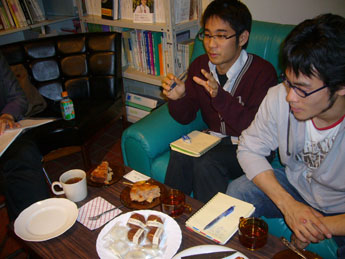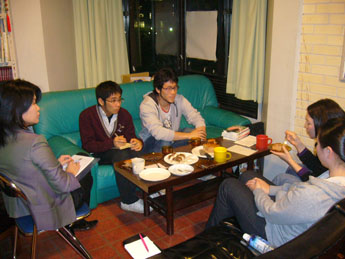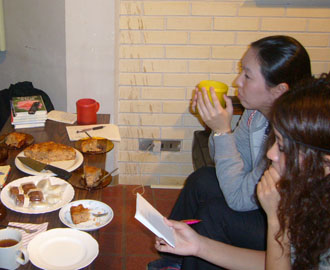Shintaro ISHIGURO
Chair, ICU Festival Committee 2008
Keita UEHARA
Committee Planner, ICU Festival Committee 2008
Naoko TAKAYAMA
Counselor, Support House Jomu
Makiko ISERI, Takako NIWA and Naomi SUZUKI
CGS staff members
【The article below is the same as the article that appears in the 11th issue of the CGS Newsletter. The full Japanese version of this discussion can be viewed on here.】

Last year, the ICU Festival 2008 committee had several meetings with CGS staff to discuss whether or not a beauty contest should be held at the ICU festival. Today, Mr. Ishiguro (SI) and Mr. Uehara (KU) of the festival committee met with CGS staff members (Iseri (MI), Niwa (TN) and Suzuki (NS)) for a round-table discussion facilitated by Ms. Takayama (NT) a professional counselor. We hope this article will clarify the issues involved and help you form your own opinions.
Mixed Feelings Within the ICU Festival Committee?
NT: So what was the initial purpose of holding a beauty contest?
SI: Well, we did not receive many proposals for a public event at first, so some of us approved a beauty contest on the condition that it would eventually become an event that involved the public.
KU: There were two different opinions within the committee. Some said beauty contests were pretty popular in other universities and would attract attention. But others, like the Chair, said we should have some kind of public contest, but one not specifically based on beauty.
SI: Yes, ICU is known for its gender studies... And I thought a beauty contest might not be enjoyable for some people like gay, lesbian and transgender people. If so such an event would be inappropriate here.
NT: Did you hope that bringing the issue to CGS would help to settle it, after failing to reach a satisfactory agreement within the committee? So you could go ahead with it if CGS said it would be ok?
SI: Yes. I was also expecting to take back a NO from CGS to the committee. I thought it would make them give up on the plan (laugh).
Do Beauty Contests Live Up to the ICU Ideal
SI: But I guess those who wanted to hold a beauty contest were in a way seeking to question the existing rules of ICU, which makes them, I think, "critical thinkers" that ICU always wants us students to be.
NT: So opposing the no-beauty-contest rule is like a critical practice?
NS: Our stance on this is not that there should be no beauty contest because it is a beauty contest. We're against the idea of having the same old, conventional beauty contest that other universities have. In our view, critical thinking means going against such conventions.
NT: So there's never been a beauty contest at ICU? Is there any reason?
KU: No, not for the past 20 years, the event plans of which we've reviewed. One of the reasons behind it is, I think, this center.
 NS: CGS was only started in 2004, so I don't think that is the case.
NS: CGS was only started in 2004, so I don't think that is the case.
NT: What about this year? Did CGS take any direct action to stop it?
SI: No, they did not.
Problems of Beauty Contests at ICU
NT: Well why is CGS so against conventional beauty contests?
TN: First of all, "beauty" as a standard is too vague.
NS: That beauty is vague doesn't mean it is independent of external factors like the media and our daily lives. If this proposed beauty contest had been somewhat different from others and judgments would have been completely free of external values of beauty, then it may have been possible for an ugly person like me to win. So I might have even given it a try. But that wouldn't be the case. Rather, the widely accepted beautiful/ugly distinction would have been reinforced on our campus. The distinction is everywhere, and I'm always encountering it, like, once I protested against a guy feeling me up on the train and he said "Why would I touch such an ugly-face?"
TN: (laugh) You hear many judgmental remarks off-campus like "fat-ass" and "ugly-face." And a lot of people are tired of it. That's why we didn't like the idea of bringing such sadness onto our campus, at our supposedly fun festival. Judgments are everywhere and we can't completely avoid them, but once confirmed by "official practice" at a contest, it makes people less guilty of making them. I think that's at the very root of our opposition to staging a beauty contest at ICU.
NT: So on campus, there's less of this psychological discomfort?
TN: Maybe that's a myth. We hear things like "that guy's hot" and "that girl's ugly" even on campus. But because we don't have beauty contests, there's no official announcement of who's beautiful and who's not, so some people feel less judged. I think that's something to be preserved, not destroyed by starting beauty contests on campus.
KU: By the way, you said even if we were to hold a male beauty contest along with a female one, it would create another problem involving the assumption of gender distinction….
MI: Well, the problem is, who is that "woman" or "man" you speak of, and ultimately, who has the right to decide which gender they are? We like to call ourselves "critical thinkers" as the ICU slogan goes, but we tend to be more sensitive about issues of race and class than of gender. Let's say somebody comes up with a plan for a "Whiteness Contest," in which anyone can participate, arguing that race is only an arbitrary notion. There'd be so many "no way" responses to it. But, there are also many different women, some of whom don't identify as a woman but are labeled as such, some of whom aren't heterosexual, but you're going to put all of them up on stage and decide who's the "best woman" by ballot. And there'd be much less opposition. When it comes to gender issues, people tend to see CGS as the only thorn - a group of loud-mouthed feminists. I think the problem we're discussing here stems from this campus-wide insensitivity .
Other Possibilities? The Problem of "Contests"
KU: So, we understood some of the problems with beauty contests, and came up with a "Person of ICU" contest for the person having the strongest characteristics of ICU-ness. But we soon realized this would raise similar issues. Many people would still vote for those whose appearance they favor because of time restrictions for contestants on stage. Another danger is of setting up a standard of ICU-ness and deciding on the "best ICU student" in an official event. So we came up with a simpler idea: a performance contest in which contestants would show the audience what they're good at. We were pretty positive that this plan presented fewer problems, but it was only proposed just before the fall trimester began, so, given the limited amount of time for preparation, we had to cancel it.
NT: So a performance contest would evaluate based on excellence?
KU: Yes. There'd be no mention of personality, either. The audience would only evaluate the performance itself.
MI: Ooooh, I would have been part of it!
TN: (laugh) So, what do you think was the difference?
KU: In general, it wouldn't cause as much trouble as a beauty contest?
NS: Right. And that's what a "festival" is supposed to be. Showing off something you usually don't get praised for, like eating100 plates of noodles, and enjoying the unusual. That's what festivals are.
KU: Yeah, no one's gonna get hurt by watching somebody win a 100-plates-of-noodles title, right?
NS: Yes, because there's no socially accepted standard for the number of noodle plates one can eat. No molester who'd say, "why would I touch such a person who's incapable of eating 100 plates of noodles!" So it's much safer. But there's always a risk.
MI: CGS would probably be fine with the food-eating contest, but from the perspective of famine issues, it can be a problem.
NS: That's why we suggested in previous discussions that you as the opinions of other research centers on campus. Listen to as many voices as you can to modify your plan until it is the best possible.
SI: But isn't it possible,for example, if somebody performs a gender-related performance at the contest, and doesn't get many votes, that it would show what CGS is doing is not valued by students.
TN: Wait, but votes are based solely on performance excellence, right?
SI: Yes.
TN: So if that happens, it's because he or she has done a bad job.
NS: But if there's any yelling from the audience that taken as sexual harassment or homophobic, CGS might publish an article expressing they're disappointment. But I don't think it's the committee's fault if such a thing happens. There's no way to control everyone's behavior.
TN: No matter what political or strong opinion may be behind it, if a performance is dull, then that's it. Excellence is what matters. That's good for us, too; if the competition were personality-based, your idea would be denied by majority-rule, but not in a performance contest.
For the Future…
NT: The demand for beauty contests is clearly real, but at the same time, so is the position taken by CGS. Neither is right or wrong. The committee members are in a difficult position, aren't you?
NS: I didn't realize that, but now I'm glad we talked today. We at CGS are always willing to make commitments to issues like this. I hope you'll share our discussion with your committee so the relations between our groups will continue to be productive.
NT: This is a historic moment in a way, because future students have recourse to the record of our discussion when they are faced with similar problems. Isn't that great?
SI: For the past year, we've been discussing this and I've learned so much. Thank you. I think Mr. Uehara is also satisfied with the cancellation of the contest… Can you share your thoughts with us?
KU: Well, I feel that we've gone through something that completely subverted the whole planning process of the ICU Festival committee. We were sandwiched by the demand for a beauty contest and a vision of providing fun for all without exception. We started with a very positive attitude, but experienced so many obstacles along the way and discussions that were sometimes painful. I feel more hopeful that we can do something "beyond the ordinary" now that we've been opened to so many possibilities with the awareness of many, sometimes conflicting, perspectives. And I'm grateful to CGS, PGSS, and the presence of sexual minority students on campus. I think it's something that characterizes ICU as a place of learning.
TN: Well, I must thank you for your decision to visit CGS and have this discussion with us.
NS: Yeah…, visit the feminists' haven….
MI: (laugh) If you should need any resources for your senior thesis or other things, we have many books and graduate students who can help you. So please feel free to visit us again.